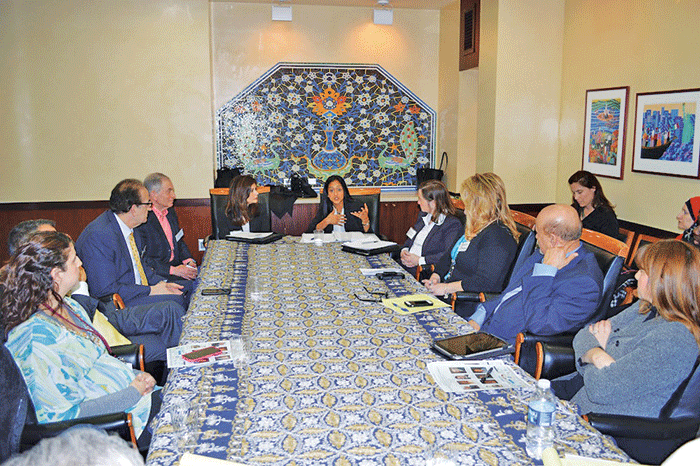
DEARBORN — Arab American activists and civil rights advocates met with Vanita Gupta, the acting assistant attorney general for the Civil Rights Division, as a part of BRIDGES.
Community grievances, including the “no fly” and “terrorist watch” lists and mass closure of bank accounts, were discussed at the meeting, which took place at the Arab American National Museum on Thursday, March 5.
Building Respect in Diverse Groups to Enhance Sensitivity (BRIDGES) was formed shortly after 9/11, in an effort to increase cooperation between government agencies and local leaders and address the backlash against the Arab Americans in southeast Michigan.
The meeting was attended by Nabih Ayad, the chairman of the Arab American Civil Rights League; Fatina Abdrabboh, the Michigan director of the American-Arab Anti-Discrimination Committee (ADC); Ali Baleed Almaklani, the executive director of the Yemen American Benevolent Association (YABA); The Arab American News publisher Osama Siblani; and Ali Hammoud, the president of the Arab American Political Action Committee (AAPAC), among other activists.
Dr. Yahya Basha, the co-chair of BRIDGES, said the meeting was productive and described Gupta, who is the top civil rights prosecutor in the department of justice, as a “positive” person.
“We talked about issues of civil rights and human rights and raised concerns about hate crimes,” he said. “She seemed to be knowledgeable of the problems of discriminations and promised to look into the issues.”
Basha said the meeting discussed the heavy screening and interrogation of Arab Americans at airports and at the U.S.-Canada border.
“Federal agents are heavy-handed when they deal with Arab Americans at the border,” he said. “People feel a reasonable sense of discrimination, abuse and insults. We have many concerns. It is a long journey that will require a lot of effort from the administration.”
BRIDGES meets regularly with local federal officials. Basha said the federal government’s representatives in Michigan do convey the community’s complaints, but for long lasting changes in the treatment of Arab Americans at the border, BRIDGES might have to deal directly with the Department of Homeland Security officials in Washington who write and execute the policies.
Last month, BRIDGES elected Ayad as its community co-chair for next year. BRIDGES has two co-chairs, one representing the community and the other to represent the government.






Leave a Reply